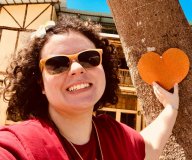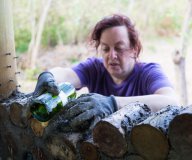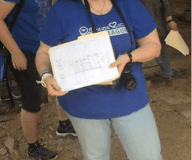Written by Random Acts staff member Jennifer Willis-Rivera:

As a professor in the United States, I walk into a classroom almost every day. The same was true on February 12, 2018. Only it was different. I was walking into a classroom in Nicaragua. As I stood in front of the 33 students, I marveled at how far the school had come since buying them a yellow school bus 5 years ago. Teaching these students made me reflect back on my own students, and my own understandings of what school and education are.
In Nicaragua, most of the elementary students (K-6th grade) go to school in the morning. At noon, the 7th-9th graders come in. In the United States, students are required to go to school through 12th grade, but in Nicaragua, they are required to go through 8th grade. The days I taught in Nicaragua were the first days of school for the students. The students at the Free High School only come to the school once a week. When they are at the school, they spend the whole day there. Students especially spend time at the Free High School learning English and learning how to use computers. The ESL (English as a second language) program is in its very beginnings, but the teachers had just had a three-day workshop on ESL strategies and were excited to work with the students.
In some ways, the students are not very different. Students came into the classroom, backpacks in one hand and often a phone in the other. They filed into the back rows first (of course!) and gradually filled in the middle and front rows. They giggled and joked with each other before class actually began. As I taught some basic English phrases “Hello! How are you? I’m fine, how are you?” they were shy, and sometimes hesitant to participate (just like in my classes!), but with some cajoling, all the students worked through the phrases.
We talked about making mistakes, and how making mistakes helps you to learn. My Spanish vocabulary is not horrible, but my grammar is, and I gave them permission to laugh with me when I made mistakes (I actually called a student a demon mistakenly as I was trying to say his name. They laughed a lot at that one). Showing them how I made mistakes, I hope, made it easier for them to feel ok about making mistakes. We worked through learning how to ask someone’s name, and where they are from.
But in some ways, these students are very different. The students live in rural areas that typically have no running water. They are often needed to help their families survive through farming or through selling things in the larger towns. This can interfere with schooling. One of the days the students left at 2:30pm, which was 45 minutes earlier than students had left the other day. Héctor, one of the teachers, explained to me that these students lived farther away than most of the other students who attend the Free High School. If they left at 2:30, they would be home by 6:00 or 6:30 that night. A FOUR HOUR trip – each way! These students really want to learn – they hunger for the education that the Free High School can give them.
We are so excited that the Free High School is up and running – but we still need your help! Sponsor a student – it costs about $200 to educate one student for a full year – that’s less than $4 a week – one cup of coffee! Can you help? Go to http://nicaragua.randomacts.org and sign up for a monthly donation of at least $20 a month. Help these amazing students get the education they deserve.


